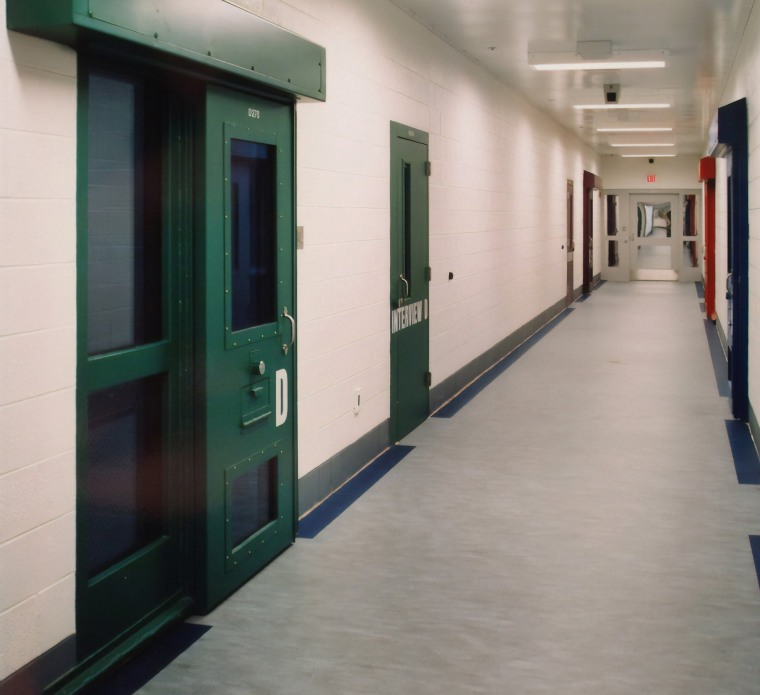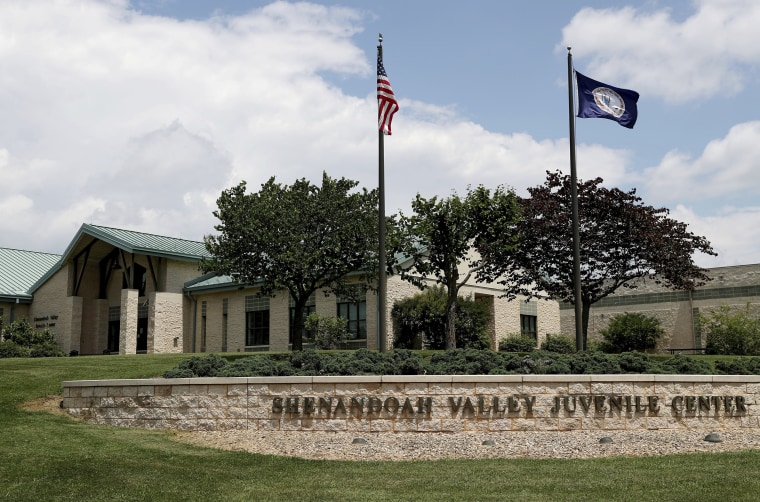WASHINGTON — A state review into the treatment of immigrant teens held at a Virginia detention center confirmed the facility uses restraint techniques that can include strapping children to chairs and placing mesh bags over their heads.
But investigators concluded the harsh treatment described by detainees at the Shenandoah Valley Juvenile Center did not meet the state's legal threshold of abuse or neglect, according to a copy of the findings issued Monday by the Virginia Department of Juvenile Justice and obtained by The Associated Press.
The regulators did make several recommendations to improve conditions inside the facility located in the mountains near Staunton, Virginia, including hiring more bilingual staff, expanding "culturally relevant programming" and improving screening to provide care for detainees who suffer from mental health issues. The state also said administrators should consider new furniture and fresh paint to make the jail-like facility "more developmentally appropriate."

Virginia Gov. Ralph Northam ordered the review in June, hours after the AP published first-person accounts by children as young as 14 who said they were handcuffed, shackled and beaten at the facility. They also described being stripped of their clothes and locked in solitary confinement, sometimes strapped to chairs with bags over their heads.
The state investigators said they were unable to interview the immigrant teens who made sworn statements saying they were severely abused. Those who made the initial complaints as part of a federal class-action lawsuit filed in November 2017 were subsequently transferred to other facilities or deported back to their home countries after the resolution of their immigration cases.
The Virginia governor issued a statement applauding his administration's "quick and comprehensive examination."
"I take these allegations very seriously and directed members of my administration to immediately look into these claims of abuse and mistreatment," said Northam, a Democrat. "The safety of every child being held there is of the utmost importance."
The legal advocacy group representing the Latino teens suing the facility called the state's review "deeply flawed" and said the investigators never contacted them or asked to speak to their clients.
"The children in this facility are denied necessary mental health care and subjected to abusive conditions," said Jonathan Smith, executive director of the Washington Lawyers' Committee for Civil Rights and Urban Affairs. "We look forward to proving our case in court."
The incidents described in sworn statements from six Latino teens included in the lawsuit are alleged to have occurred between 2015 and 2018, under both the Obama and Trump administrations.
Though incarcerated in a facility similar to a prison, the children detained on administrative immigration charges have not been convicted of any crime. The U.S. Office of Refugee Resettlement oversees the care of immigrant children held in federal custody.
Following the AP's report in June, state investigators interviewed 22 federal detainees currently held at the Shenandoah facility. Of those, three said they had experienced abusive behavior by staff. According to the state report, local child protective services investigators reviewed those complaints and determined they "did not meet the legal definition of abuse or neglect."
The state investigators were only allowed to interview the federal detainees while a member of the facility's staff was in the room. They also reviewed case files, medical records and other documents kept inside the facility, but were barred from making any copies or keeping any handwritten notes.
Shenandoah deputy director Timothy Showalter issued a statement Monday that touted the state's findings as an exoneration.
"The report confirms our long-standing dedication to being a well-run facility that treats our residents with respect and dignity," the facility's statement said.
Officials at the Department of Health and Human Services, which includes the Refugee Resettlement office, did not respond Monday to emails seeking comment. Federal officials have refused to discuss when they first learned of the abuse allegations at the Shenandoah center and whether any action has been taken to determine the veracity of those claims.
The Shenandoah lockup is one of only three juvenile detention facilities in the United States with federal contracts to provide "secure placement" for immigrant children who had problems at less-restrictive housing.
On average, 92 immigrant children each year cycle through Shenandoah, most of them from Mexico and Central America. It received $4.2 million in federal funds last year to house children between the ages of 12 and 17 facing deportation proceedings or awaiting rulings on asylum claims.
While the state investigators said they found no evidence of the beatings and other severe abuse described in the 2017 lawsuit, their report does confirm that staff at the Shenandoah facility are trained in the use of restraint chairs and "mesh spit guards" for "out-of-control residents who cannot be safely restrained by less intrusive methods."
Such restraint devices are legal for use in juvenile detention facilities in Virginia, though regulations say they can never be used as punishment and are only appropriate "to ensure the safety and security of residents, staff and the facility."
In two of the instances reviewed by investigators, the report says staff members at the facility were disciplined for using restraint techniques that did not follow state guidelines. However, those incidents, which were not detailed in the report, did not involve the use of restraint chairs.

While some teens cited in the lawsuit reported being left in the restraint chair overnight or isolated alone in their cells for days at a time, the investigators said the documents they reviewed showed no record of that. According to the facility's records, there was only one documented example of a child kept locked in isolation for 23 consecutive hours.
As part of their findings, the state investigators recommended the facility's staff receive additional instruction in techniques for deescalating conflicts and retraining in how to safely strap down unruly teens.
"Although SVJC's procedures for mechanical restraints meet certification regulations, the procedure could be clearer and specific to the use of mechanical restraints," the state report said. "The use of a restraint chair and spit guards, as well as when and how it is used, should be better defined."
